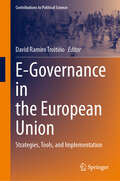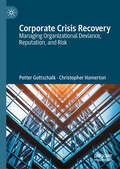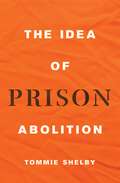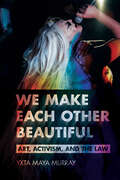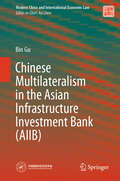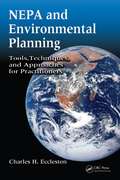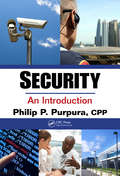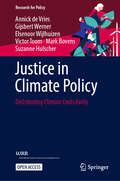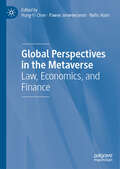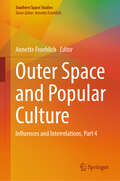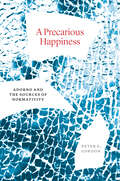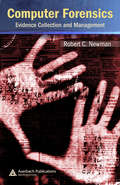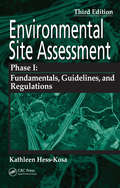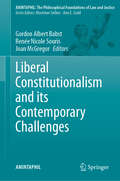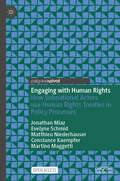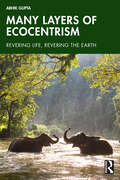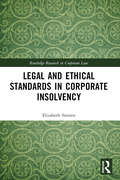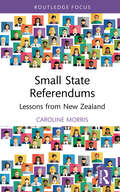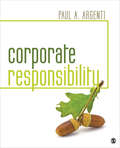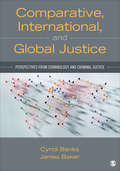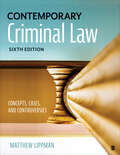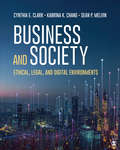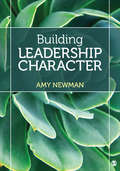- Table View
- List View
E-Governance in the European Union: Strategies, Tools, and Implementation (Contributions to Political Science)
by David Ramiro TroitiñoThis book sheds new light on the future of e-governance in the European Union (EU). Drawing on the first-hand professional experience of practitioners, policymakers, and institutional stakeholders, combined with a sound academic foundation, it offers insights into successful implementation strategies and new tools necessary for efficient e-governance in the European Union. The authors present key topics, e.g. the development of e-services such as e-identity, e-health, e-democracy, as well as e-governance tools for the correct implementation of the Digital Single Market. Furthermore, they discuss the legal framework needed for the implementation of these services, such as data protection, digital competition law, as well as EU contracts in digital environments. Finally, the authors highlight efforts to include ethical standards and European values in the decision-making, while developing a vision for the future use of e-governance in the European Union.Understanding the tools and strategies for a successful implementation of e-governance services, as well as the necessary legal framework, will allow professionals such as policymakers and institutional stakeholders, to improve their performance and achieve better results when working on the development of future e-governance services in the European Union.
Corporate Crisis Recovery: Managing Organizational Deviance, Reputation, and Risk
by Petter Gottschalk Christopher HamertonThe principal aim of Corporate Crisis Recovery: Managing Organizational Deviance, Reputation, and Risk is to complement and expand criminological discourse on the concept of the social license to operate as a means of influencing the behaviour of corporations. In recent years, the wide-spanning consequences of some very public globalized corporate crises – including fiscal and environmental impact, staff retention, and organizational survival – have led to a growing body of research on crisis perception and responsive strategic management. Developments that position corporate crisis recovery as an anticipated requirement of visible compliance to normalized and anticipated standards of ethical practice and business conduct. Utilizing convenience theory to illustrate how corporations, and the individuals therein, are able to lose, repair, and recover the corporate license to operate after corruption and scandal, the book develops to evaluate the responses of the public and criminal justice process to serious reputational damage and substantial breach of trust.
The Idea of Prison Abolition (Carl G. Hempel Lecture Series #13)
by Tommie ShelbyAn incisive and sympathetic examination of the case for ending the practice of imprisonmentDespite its omnipresence and long history, imprisonment is a deeply troubling practice. In the United States and elsewhere, prison conditions are inhumane, prisoners are treated without dignity, and sentences are extremely harsh. Mass incarceration and its devastating impact on black communities have been widely condemned as neoslavery or &“the new Jim Crow.&” Can the practice of imprisonment be reformed, or does justice require it to be ended altogether? In The Idea of Prison Abolition, Tommie Shelby examines the abolitionist case against prisons and its formidable challenge to would-be prison reformers.Philosophers have long theorized punishment and its justifications, but they haven&’t paid enough attention to incarceration or its related problems in societies structured by racial and economic injustice. Taking up this urgent topic, Shelby argues that prisons, once reformed and under the right circumstances, can be legitimate and effective tools of crime control. Yet he draws on insights from black radicals and leading prison abolitionists, especially Angela Davis, to argue that we should dramatically decrease imprisonment and think beyond bars when responding to the problem of crime.While a world without prisons might be utopian, The Idea of Prison Abolition makes the case that we can make meaningful progress toward this ideal by abolishing the structural injustices that too often lead to crime and its harmful consequences.
The Woods: A gripping thriller from the #1 bestselling creator of hit Netflix show Fool Me Once
by Harlan CobenNOW A NETFLIX ORIGINAL SERIES! The bestselling author and creator of the hit Netflix drama Fool Me Once takes readers into the heart of a family in this twisty page-turner that proves the darkest secrets are often closest to home.Twenty years ago, four teenagers disappeared in the woods. Now, two decades later, everything is changing... Paul Copeland's sister went missing 20 years ago. Now raising a daughter alone, Cope balances family life with a career as a prosecutor. But when a murder victim is found with evidence linking him to Cope, the well-buried secrets of the past are threatening everything. Is this body one of the campers who disappeared with his sister? Could his sister be alive...? Confronting his past, Cope must decide what is better left hidden in the dark and what truths can be brought to light...
We Make Each Other Beautiful: Art, Activism, and the Law (Publicly Engaged Scholars: Identities, Purposes, Practices)
by Yxta Maya MurrayWe Make Each Other Beautiful focuses on woman of color and queer of color artists and artist collectives who engage in direct political action as a part of their art practice. Defined by public protest, rule-breaking, rebellion, and resistance to governmental and institutional abuse, direct-action "artivism" draws on the aims, radical spirit, and tactics of the civil rights and feminist movements and on the struggles for disability rights, queer rights, and immigrant rights to seek legal and social change. Yxta Maya Murray traces the development of artivism as a practice from the Harlem Renaissance to Yoko Ono, Judy Baca, and Marsha P. Johnson. She also studies its role in transforming law and society. We Make Each Other Beautiful profiles the work and lives of four contemporary artivists —Carrie Mae Weems, Young Joon Kwak, Tanya Aguiñiga, and Imani Jacqueline Brown—and the artivist collective Drawn Together, combining new oral histories with sharp analyses of how their diverse and expansive artistic practices bear important aesthetic and politicolegal meanings that address a wide range of injustices.
Chinese Multilateralism in the Asian Infrastructure Investment Bank (Modern China and International Economic Law)
by Bin GuThis book reflects the latest legal development of the Asian Infrastructure Investment Bank (AIIB), and makes direct and positive responses—it uses first-hand, authoritative information and makes insightful and persuasive analyses in addressing those concerns.In particular, this book provides nuanced analysis of the following topics:— capital allocation of the AIIB, in comparison with those of Bretton Woods institutions;— dynamic relationship between the shareholder board and management, a central topic of corporate governance for the AIIB and other MDBs;— AIIB’s environmental and social safeguards, including its frontier ESG portfolio investments, in comparison with the World Bank standards;— highly debatable issues relating to the interaction between AIIB, Belt and Road, and MCDF;— comparative study of state-owned enterprises in the laws of AIIB, WTO, ICSID, etc..This book targets academics, students, policymakers, and businesscircles who are interested in AIIB, given the bank’s growing importance in the context of global economic governance reforms. First, the book is a must for those who are keen to gain insight into the AIIB. Ten years have passed since the debut of the idea of AIIB in 2013, and the topic has never retreated from the debate of the international community—a major concern is whether a China-led multilateral development bank (MDB) remains to be politically neutral, or professional, and can live up to high standards.
NEPA and Environmental Planning: Tools, Techniques, and Approaches for Practitioners
by Charles H. EcclestonA tool for predicting environmental impacts, the National Environmental Policy Act (NEPA) can also be used to predict the impacts of natural disasters and potential terrorist attacks. This book demonstrates how to use NEPA as a framework to support decision-making. It includes examples that demonstrate how NEPA can be efficiently integrated with other processes such as ISO 14001, P2, and Adaptive Management. It provides proven tools, techniques, and approaches for streamlining NEPA and environmental planning strategies that reduce the potential for controversy and criticism. It is the first text that covers recent changes to NEPA and the new CEQ guidance expected to be issued.
Security: An Introduction
by Philip P. PurpuraToday, threats to the security of an organization can come from a variety of sources- from outside espionage to disgruntled employees and internet risks to utility failure. Reflecting the diverse and specialized nature of the security industry, Security: An Introduction provides an up-to-date treatment of a topic that has become increasingly comple
Justice in Climate Policy: Distributing Climate Costs Fairly (Research for Policy)
by Mark Bovens Victor Toom Annick de Vries Gijsbert Werner Elsenoor Wijlhuizen Suzanne HulscherThis open access book is looking into ways to achieve just climate policy within a country. The authors of this monograph share a unique, timely and original vision: continuous support for climate policy is more likely to emerge when citizens find that the distribution of the bill for climate costs is fair. But what is a fair distribution of climate costs? This is an important question because financial costs of mitigation (reducing greenhouse gases), adaptation (adapting to climate change) and damage (compensating or compensating after weather extremes) increase significantly in the coming decades. Drawing on philosophy and ethics, the authors propose ten principles for achieving just distributions of domestic climate costs. Examples of such principles are individual responsibility, the polluter pays, greatest utility and capacity to pay. Yet what a fair distribution is, depends on, for example, political preferences and the policy issue at hand. Empirical research on designing climate policies, however, shows that distributive principles are not part of the political, policy, and public discussions. The authors therefore argue that explicit attention to principles of just distribution at the start of a policy process contributes to support for climate policy. This book provides tools to professionals and students to achieve justice in climate policy.
Global Perspectives in the Metaverse: Law, Economics, and Finance
by Nafis Alam Hung-Yi Chen Pawee JenweeranonThe metaverse is undergoing rapid and transformative changes, yet it has thus far lacked a comprehensive scholarly examination from a global and comparative standpoint. The publication addresses existing gaps by introducing fresh perspectives and frameworks across various domains within the metaverse, including law, economics, and finance. Drawing upon the expertise of an international cohort of scholars and practitioners, this volume illuminates emerging interdisciplinary insights with global relevance, facilitating a comparative analysis of diverse aspects of the metaverse. Timely and essential, this book contributes significantly to the metaverse literature, addressing urgent issues in this evolving landscape.
Outer Space and Popular Culture: Influences and Interrelations, Part 4 (Southern Space Studies)
by Annette FroehlichFollowing on from the highly acclaimed Parts 1 to 3, this book provides detailed insights into how space and popular culture intersect across a broad spectrum of examples, including cinema, music, art, arcade games, cartoons, comics, and advertisements. This is a pertinent topic since the use of space themes differs in different cultural contexts, and these themes can be used to explore various aspects of the human condition and provide a context for social commentary on politically sensitive issues. With the use of space imagery evolving over the past sixty years of the space age, this is a topic ripe for in-depth exploration. The book also discusses the contrasting visions of space from the late nineteenth and early twentieth centuries and the reality of today and analyzes space vehicles and habitats in popular depictions of space from an engineering perspective, exploring how many of those ideas have actually been implemented in practice and why or why not (a case of life imitating art and vice versa). As such, it covers a wide array of relevant and timely topics examining intersections between space and popular culture and offering accounts of space and its effect on culture, language, and storytelling from the southern regions of the world.
A Precarious Happiness: Adorno and the Sources of Normativity
by Peter E. GordonA strikingly original account of Theodor Adorno’s work as a critique animated by happiness. "Gordon’s confidently gripping and persistently subtle interpretation brings a new tone to the debate about Adorno’s negativism."—Jürgen Habermas Theodor Adorno is often portrayed as a totalizing negativist, a scowling contrarian who looked upon modern society with despair. Peter E. Gordon thinks we have this wrong: if Adorno is uncompromising in his critique, it is because he sees in modernity an unfulfilled possibility of human flourishing. In a damaged world, Gordon argues, all happiness is likewise damaged but not wholly absent. Through a comprehensive rereading of Adorno’s work, A Precarious Happiness recovers Adorno’s commitment to traces of happiness—fragments of the good amid the bad. Ultimately, Gordon argues that social criticism, while exposing falsehoods, must also cast a vision for an unrealized better world.
Computer Forensics: Evidence Collection and Management
by Robert C. NewmanComputer Forensics: Evidence Collection and Management examines cyber-crime, E-commerce, and Internet activities that could be used to exploit the Internet, computers, and electronic devices. The book focuses on the numerous vulnerabilities and threats that are inherent on the Internet and networking environments and presents techniques and suggestions for corporate security personnel, investigators, and forensic examiners to successfully identify, retrieve, and protect valuable forensic evidence for litigation and prosecution. The book is divided into two major parts for easy reference. The first part explores various crimes, laws, policies, forensic tools, and the information needed to understand the underlying concepts of computer forensic investigations. The second part presents information relating to crime scene investigations and management, disk and file structure, laboratory construction and functions, and legal testimony. Separate chapters focus on investigations involving computer systems, e-mail, and wireless devices. Presenting information patterned after technical, legal, and managerial classes held by computer forensic professionals from Cyber Crime Summits held at Kennesaw State University in 2005 and 2006, this book is an invaluable resource for thosewho want to be both efficient and effective when conducting an investigation.
Environmental Site Assessment Phase I: A Basic Guide, Third Edition
by Kathleen Hess-KosaExtensively updated to reflect the most recent changes to the All Appropriate Inquiries Rule (theRule ) and the ASTM Environmental Site Assessment Standard (theStandard ), Environmental Site Assessment Phase 1, Third Edition provides a valuable guide to the techniques of performing Phase 1 site assessment. Promoting a better understandin
Liberal Constitutionalism and its Contemporary Challenges (AMINTAPHIL: The Philosophical Foundations of Law and Justice #12)
by Joan McGregor Gordon Albert Babst Renée Nicole SourisThe edited volume brings together contemporary work by philosophers, legal scholars, and political theorists. This volume presents relevant understandings of the common good, democracy, liberty, and law, and situates them in the context of contemporary countervailing pressures posed by issues in education, access to medical treatment in a pandemic, and the media. Motivated to ascertain how democracy is threatened by a variety contemporary challenges, the authors examine core aspects of law, representative democracy, and constitutionalism to shed light on worrisome contemporary phenomena such as social media-driven conspiracy theories, unequal access to education and medical treatment, among other topics.
Öffentlichkeitsarbeit der Beteiligten im Strafverfahren und mediale (Verdachts-)Berichterstattung: Neue Überlegungen zur „Störung der Strafrechtspflege“ vor dem Hintergrund des Internetzeitalters
by Janine FielitzBei medial begleiteten Strafverfahren geht es nicht mehr nur um die Wahrheitsfindung; die Verfahrensbeteiligten streben zunehmend danach, die Deutungshoheit über die mediale und öffentliche Meinung zu gewinnen. Neben der Öffentlichkeitsarbeit der Ermittlungs- und Justizbehörden und der damit einhergehenden, durch die internetbedingten Entwicklungen erhöhten Risiken und Gefahren für die Rechte und Interessen des Beschuldigten, befasst sich die Autorin insbes. mit den (als Verbindungsglied zwischen Strafjustiz und Öffentlichkeit fungierenden) Medien, der medialen (Verdachts-)Berichterstattung sowie der Öffentlichkeitsarbeit (Litigation-PR) der Verteidigung und Nebenklage. Sie zeichnet ein umfassendes Bild von dem Zusammenspiel und den Wechselwirkungen zwischen der Öffentlichkeitsarbeit der Beteiligten im Strafverfahren und der Medienberichterstattung, von den unterschiedlichen Rollen, den jeweiligen (z.T. konträren) Interessen, Rechten und Pflichten der Akteure, deren Handlungs- und Gestaltungsmöglichkeiten und den sich in diesem Zusammenhang für den Beschuldigten, die sonstigen Verfahrensbeteiligten, das Verfahren und damit auch für die Strafrechtspflege ergebenden Auswirkungen und Risiken.
Engaging with Human Rights: How Subnational Actors use Human Rights Treaties in Policy Processes (Palgrave Socio-Legal Studies)
by Martino Maggetti Evelyne Schmid Jonathan Miaz Matthieu Niederhauser Constance KaempferMaking human rights a reality requires that various types of domestic actors take measures, which is often demanding, all the more so in federal systems. This open access book, Engaging with Human Rights: How Subnational Actors use Human Rights Treaties in Policy Processes, shows that an important part is played at the subnational level, with repeated back-and-forth between and within levels of governance rather than a ‘top-down’ trajectory. The dynamics of implementation at national and sub-national level is an emerging area of study. This book explores how actors use human rights treaties in the policy process, sometimes leading to an engagement that increases human rights implementation, and at other times not. Treaties provide both opportunities and constraints. Switzerland, as a highly decentralized federal state, offers a perfect setting to study the processes at work. Using legal, political, and sociological analyses, the authors draw on over 65 semi-structured interviews and focusses on two topical case studies: violence against women, including domestic violence, and the rights of persons with disabilities. This book provides a blueprint for other researchers and practitioners who wish to study the concrete implementation and impacts of human rights obligations.
Many Layers of Ecocentrism: Revering Life, Revering the Earth
by Abhik GuptaThis book unveils the myriad streams of ecocentric thoughts that have been flowing through the human mind – in indigenous communities, in the wisdom of philosophers, in the creative expressions of poets and writers – sometimes latent, but sometimes more explicit. The strength of this book lies in the fact that it attempts to show that ecocentrism had not emerged suddenly as a distinct line of philosophical thought or found its place among the various normative approaches toward nature, but the seeds of ecocentrism had always been running through human societies. Thus, this book not only emphasizes the “unity of life” but also reveals the inherent unity of all hues of ecocentrism. The book adopts a multidisciplinary approach, which is essential to dwell on a topic like ecocentrism which permeates the domains of disciplines as disparate as science, philosophy, religion, normative ethics, myths and folklore, poetry, and literature, among others. Despite this eclectic approach, the book attempts to maintain continuity among the chapters and present these concepts in a simple form that will be easily accessible by readers from all conceivable backgrounds. This book would be useful to the students, researchers, and faculty from the fields of ecology and environmental science, philosophy, sociology, religious studies, and literature. It will also be an indispensable companion for all nature lovers, activists, and general readers interested in the emergence and evolution of environmental thoughts.
Legal and Ethical Standards in Corporate Insolvency (Routledge Research in Corporate Law)
by Elizabeth StretenRecent financial crisis and the global financial impacts of the COVID-19 pandemic have brought renewed interest to the regulation and practice of corporate insolvency and restructuring.Modernisation of the insolvency profession, and the regulation of its practitioners, is a contemporary concern and recent years have seen significant reforms of insolvency law. The success of such reforms can be enhanced through a clear understanding of difficulties faced by the insolvency profession in achieving successful restructuring and insolvency outcomes and through the determination of effective solutions to those difficulties. However, there is limited empirical data to inform the day-to-day practice of insolvency, nor the difficulties experienced by insolvency practitioners in pursing insolvency and restructuring solutions. This book addresses this absence of data and understanding, examining the role and practice of corporate insolvency practitioners and exploring the challenges that they encounter.Offering an empirical study together with a comparative analysis of the experiences of practitioners around the world, this book facilitates a greater understanding of corporate insolvency practice, confronting a misunderstanding of, and under-confidence in, corporate insolvency practitioners, making it key reading for academics, practitioners and regulators working in the area of corporate insolvency.
Small State Referendums: Lessons from New Zealand
by Caroline MorrisThis book explores the unusual and unique experience of direct democracy in the small state of New Zealand, where referendums have been a persistent feature of the political landscape for over a century. Referendums have been the site of renewed interest from scholars, seeking to respond to what they term the "democratic deficit" in otherwise stable and functional Western democracies. They have also been at the heart of many divisive and important political and social moments in recent history, from the UK’s Brexit referendum in 2016 to the disputed legitimacy of the 2022 referendums in Russian-occupied Ukraine. This book fills an important gap in the literature through an extended study of the law and practice of referendums in the small Commonwealth state of New Zealand. It also expands the field of small state democracy studies by applying the insights of this field to the direct democracy experience of a small state. With the inclusion of comprehensive tables of referendums and legislative materials, this book will be of interest to scholars of direct democracy and small states, politicians, legislators and policy makers, and all those with a desire to do democracy better.
Corporate Responsibility
by Paul A. Argenti"This is the cutting-edge textbook on a managerial approach to corporate responsibility. Students and executives will benefit a great deal by studying the cases and best practices that are here. It’s a terrific book." —Ed Freeman, Elis and Signe Olsson Professor of Business Administration, Darden School of Business, University of Virginia Corporate Responsibility offers a concise and comprehensive introduction to the functional area of corporate responsibility. Readers will learn how corporate responsibility is good for business and how leaders balance their organization’s needs with responsibilities to key constituencies in society. Author Paul A. Argenti engages students with new and compelling cases by focusing on the social, reputational, or environmental consequences of corporate activities. Students will learn how to make difficult choices, promote responsible behavior within their organizations, and understand the role personal values play in developing effective leadership skills.
Comparative, International, and Global Justice: Perspectives from Criminology and Criminal Justice
by Denis William Baker Cyndi L. BanksComparative, International and Global Justice: Perspectives from Criminology and Criminal Justice presents and critically assesses a wide range of topics relevant to criminology, criminal justice and global justice. The text is divided into three parts: comparative criminal justice, international criminology, and transnational and global criminology. Within each field are located specific topics which the authors regard as contemporary and highly relevant and that will assist students in gaining a fuller appreciation of global justice issues. Authors Cyndi Banks and James Baker address these complex global issues using a scholarly but accessible approach, often using detailed case studies. The discussion of each topic is a comprehensive contextualized account that explains the social context in which law and crime exist and engages with questions of explanation or interpretation. The authors challenge students to gain knowledge of international and comparative criminal justice issues and think about them in a critical manner. It has become difficult to ignore the global and international dimensions of criminal justice and criminology and this text aims to enhance criminal justice education by focusing on some of the issues engaging criminology worldwide, and to prepare students for a future where fields of study like transnational crime are unexceptional.
Contemporary Criminal Law: Concepts, Cases, and Controversies
by Matthew LippmanProviding a current view that prompts students to read and analyze, Contemporary Criminal Law: Concepts, Cases, and Controversies, Sixth Edition, by Matthew Lippman, combines the concepts taught in undergraduate criminal law courses with thought-provoking cases and engaging learning tools. The text uses real-life examples that students connect to and recognize to cover emerging legal topics including constitutional rights, consent, arson, identity theft, and hate crimes. Lippman clearly defines and explains criminal law and defenses and provides cases and discussion questions to stimulate critical thinking and in-class discussion. Every chapter includes cases, case notes, model penal code and discussion boxes, and learning tools. This title is accompanied by a complete teaching and learning package.
Business and Society: Ethical, Legal, and Digital Environments
by Sean P. Melvin Cynthia E. Clark Kabrina K. ChangRecipient of a 2021 Most Promising New Textbook Award from the Textbook & Academic Authors Association (TAA) Business and Society: Ethical, Legal, and Digital Environments prepares students for the modern workplace by exploring the opportunities and challenges they will face in today′s interconnected, global economy. The author team discusses legal and ethical issues throughout and uses real-world cases to provide students with a holistic understanding of stakeholder issues. Chapters on social media and citizen movements, big data and hacking, and privacy in the digital age provide in-depth coverage of how technology is transforming the relationship between organizations and consumers. Included with this title: The password-protected Instructor Resource Site (formally known as SAGE Edge) offers access to all text-specific resources, including a test bank and editable, chapter-specific PowerPoint® slides.
Building Leadership Character: Lessons In Authenticity And Credibility
by Amy NewmanExtending beyond traditional leadership books to offer readers a path for developing their own character, this compelling new text uses a storytelling approach and real-world cases to explore different dimensions of leadership character. With a clear, student-friendly writing style, bestselling author Amy Newman deftly captures various approaches in which corporations and people respond to situations in difficult times and learn from mistakes. Using real companies and situations, each chapter examines a leadership character dimension such as accountability, integrity, authenticity, and courage. Readers will learn to develop their own character, emotional intelligence, and leadership skills as they engage with assessments, reflection opportunities, and exercises.
